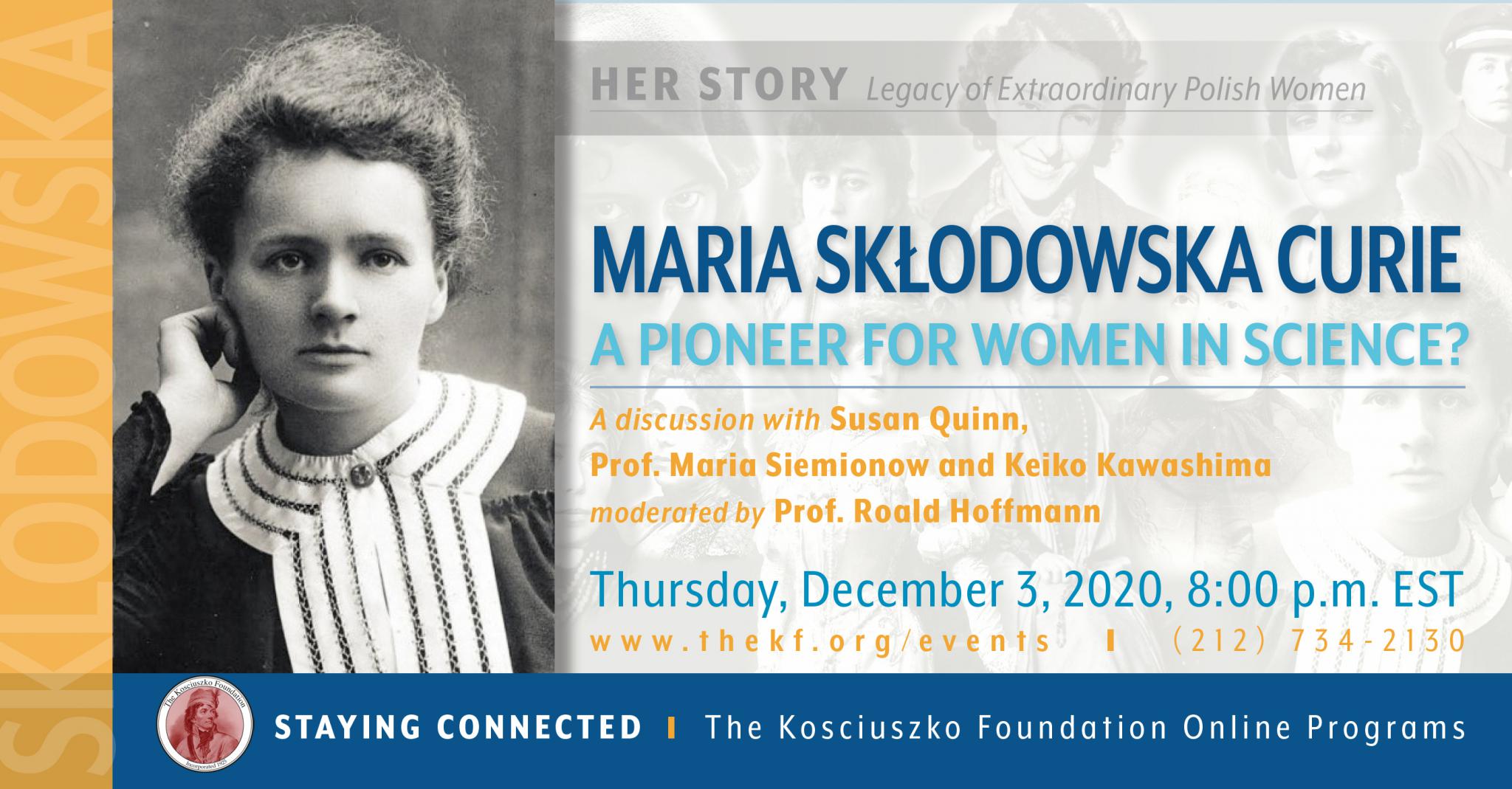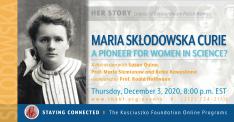KF Online Programs
Maria Sklodowska Curie – A Pioneer for Women in Science ? - A panel discussion
Thursday, December 3, 2020, at 8:00pm
SEE THE RECORDING of the webinar HERE
For more than 100 years Maria Sklodowska Curie has been inspiring generations of scientists around the world. "Madame Curie" (1867-1934) was the first woman to win a Nobel Prize, the first person ever and the only woman to receive two Nobel Prizes, and the only woman to win the Nobel Prize in two scientific fields. She was also the first woman to become a professor at the University of Paris.
In 1927, in a letter sent to Kosciuszko Foundation's Founder, Stephen Mizwa, Marie Curie agreed to establish a scholarship fund in her name. As part of the KF online programs, we have the pleasure of inviting you to the webinar discussing her life, her body of work, and her legacy as Poland's greatest scientist.
"Maria Sklodowska Curie – A Pioneer for Women in Science?"
featuring esteemed speakers:
- Susan Quinn - an award-winning author of biography Marie Curie: A Life
- Prof. Maria Siemionow - a world-renowned scientist and microsurgeon
- Keiko Kawashima - Professor at Nagoya Institute of Technology, Japan
The discussion was moderated by Nobel Prize-winning scientist, the Frank H. T. Rhodes Professor of Humane Letters, and a member of the KF Collegium of Eminent Scientists - Prof. Roald Hoffmann
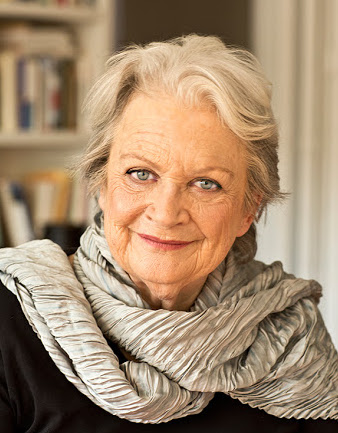 Susan Quinn has written for The Atlantic, the New York Times Magazine, and the Boston Globe Magazine, among others. While a staff writer at Boston Magazine, she received both the Penney-Missouri Magazine award and the Golden Hammer Award (from the National Association of Homebuilders) for investigative reporting.
Susan Quinn has written for The Atlantic, the New York Times Magazine, and the Boston Globe Magazine, among others. While a staff writer at Boston Magazine, she received both the Penney-Missouri Magazine award and the Golden Hammer Award (from the National Association of Homebuilders) for investigative reporting.
Her biography of Karen Horney was awarded the Boston Globe's Lawrence Winship award, and she was the recipient of a Guggenheim Fellowship and a Rockefeller residency at Bellagio in Italy for work on the life of Marie Curie. Quinn was a Los Angeles Times Book Prize finalist and was shortlisted for Great Britain's Fawcett Book Prize for Marie Curie: A Life. Her Curie biography was also designated as one of the best science-tech books of 1995 by Library Journal and was awarded the Grand prix de lectrices by Elle magazine. Her biography has been translated into nine languages and was recently reissued in a new edition in Italy and France. She was awarded an honorary doctorate in humane letters from the University of Wisconsin.
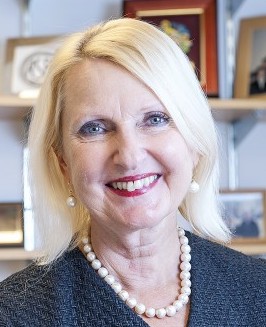 Maria Siemionow, M.D., Ph.D., D.Sc. - a world-renowned scientist and expert on vascularized composite allografts, hand surgery, peripheral nerve surgery, and microsurgery. In 2008, Prof. Siemionow led a team of surgeons that performed the first near-total face transplant in the U.S at the Cleveland Clinic.
Maria Siemionow, M.D., Ph.D., D.Sc. - a world-renowned scientist and expert on vascularized composite allografts, hand surgery, peripheral nerve surgery, and microsurgery. In 2008, Prof. Siemionow led a team of surgeons that performed the first near-total face transplant in the U.S at the Cleveland Clinic.
Prof. Siemionow served as Director of Plastic Surgery Research and Head of Microsurgical Training for Cleveland Clinic's Department of Plastic Surgery. In 2005, she was appointed Professor of Surgery in the Department of Surgery at Cleveland Clinic Lerner College of Medicine of Case Western Reserve University and in 2008, received an honorary academic appointment as Professor of Surgery at the Karol Marcinkowski University of Medical Sciences in Poznan, Poland. She currently serves as Professor and Director of Microsurgery Research, University of Illinois, College of Medicine.
Prof. Siemionow earned her medical degree from the Poznan Medical Academy in 1974, after which she completed her residency in orthopedics. She earned a Ph.D., in 1985, for her thesis Evaluation of different microsurgical techniques of vessel anastomosis of diameter less than one millimeter and also completed a hand surgery fellowship at the Christine Kleinert Institute for Hand and Microsurgery in Louisville, KY. In 1990, Prof. Siemionow was appointed Associate Professor of Surgery at the University of Utah, and in 1992, she earned a Ph.D., DSc for her thesis Hemodynamics of the microcirculation of the free muscle flap, direct in vivo study. She has authored more than 250 scientific publications.
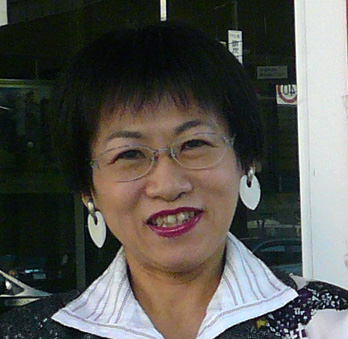 Keiko Kawashima is a Professor at Nagoya Institute of Technology, Japan. She is an executive committee member of the Japanese Society for 18th Century Studies, a member of several history of science societies in Japan, and the Gender History Association of Japan. Her first publications were devoted to the relation between gender and science, especially in 18th century France: Émilie du Châtelet et Marie-Anne Lavoisier (2013); Dictionnaire des femmes des Lumières (2015). Recently, she has worked also on female scientists around Marie Curie, in particular, the first Japanese female physicist Toshiko Yuasa, a disciple of Frédéric Joliot-Curie: "Nobuo Yamada and Toshiko Yuasa," Historia Scientiarum (2017). She received the Nao Aoyama Prize (2006) and Yamazaki Prize (2010) for her studies on gender and science. To promote the history of science, she shows her original "Manga" on her home page.
Keiko Kawashima is a Professor at Nagoya Institute of Technology, Japan. She is an executive committee member of the Japanese Society for 18th Century Studies, a member of several history of science societies in Japan, and the Gender History Association of Japan. Her first publications were devoted to the relation between gender and science, especially in 18th century France: Émilie du Châtelet et Marie-Anne Lavoisier (2013); Dictionnaire des femmes des Lumières (2015). Recently, she has worked also on female scientists around Marie Curie, in particular, the first Japanese female physicist Toshiko Yuasa, a disciple of Frédéric Joliot-Curie: "Nobuo Yamada and Toshiko Yuasa," Historia Scientiarum (2017). She received the Nao Aoyama Prize (2006) and Yamazaki Prize (2010) for her studies on gender and science. To promote the history of science, she shows her original "Manga" on her home page.
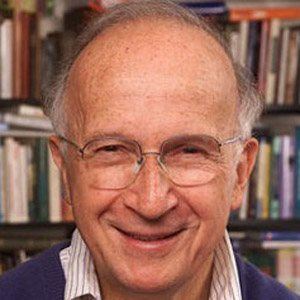 Prof. Roald Hoffmann was born in 1937 in Zloczow, Poland. Having survived the war, he came to the U.S. in 1949, and studied chemistry at Columbia and Harvard Universities (Ph.D. 1962). Since 1965 he is at Cornell University, now as the Frank H. T. Rhodes Professor of Humane Letters. He has received many of the honors of his profession, including the 1981 Nobel Prize in Chemistry (shared with Kenichi Fukui).
Prof. Roald Hoffmann was born in 1937 in Zloczow, Poland. Having survived the war, he came to the U.S. in 1949, and studied chemistry at Columbia and Harvard Universities (Ph.D. 1962). Since 1965 he is at Cornell University, now as the Frank H. T. Rhodes Professor of Humane Letters. He has received many of the honors of his profession, including the 1981 Nobel Prize in Chemistry (shared with Kenichi Fukui).
"Applied theoretical chemistry" is the way Roald Hoffmann likes to characterize the particular blend of computations stimulated by experiment and the construction of generalized models, of frameworks for understanding, that is his contribution to chemistry. The pedagogical perspective is very strong in his work.
Notable at the same time is his reaching out to the general public; he participated, for example, in the production of a television course in introductory chemistry titled "The World of Chemistry," shown widely since 1990. And, as a writer, Hoffmann has carved out a land between science, poetry, and philosophy, through many essays and three books, Chemistry Imagined with artist Vivian Torrence, The Same and Not the Same and Old Wine (translated into six languages), New Flasks: Reflections on Science and Jewish Tradition, with Shira Leibowitz Schmidt.
